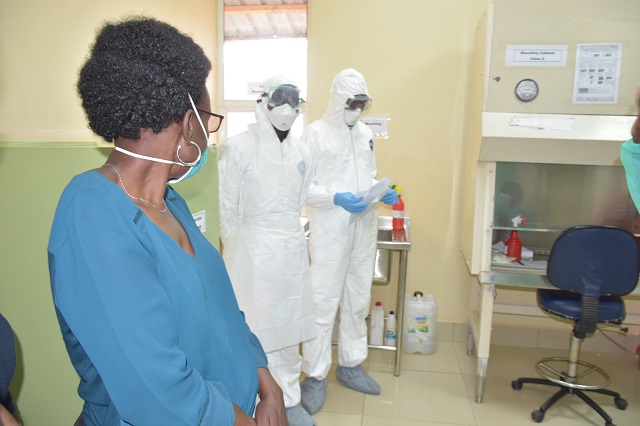
2500 Ugandans could die
Kampala, Uganda | JOSEPH WERE | Uganda on May 26 took a bold step and eased a 60-day lockdown imposed in March when the first case of the Coronavirus disease COVID-19 was registered in the country. That same day, Uganda registered the highest number of recorded COVID-19. They were 31. One day later it registered 28. In just seven days, May 20 to May 27, the number of registered COVID-19 cases in Uganda jumped from 145 to 281. That is 93% jump in cases.
By May 28 the number of registered COVID 19 cases in Uganda had reached 317 and 1550 cases were in hospital quarantine. That is a very high number already because Uganda has just 3650 beds for normal hospital admission in all hospitals combined.
Up to 900 beds are in Mulago National Referral Hospital and 1000 are in 50 general hospitals across the country. The 16 regional referral hospitals have a total of 480 beds. In case a patient needs critical care in an Intensive Care Unit (ICU), Uganda has just 288 of these.
That means that although the COVID-19 cases are still very low, Uganda’s public health sector is already overwhelmed. That is why COVID-19 patients are being quarantined in schools, hotels, and other places.
But observing Ugandans as they go about their daily business; most appear unbothered about the rising COVID-19 cases. Many stick together in crowds; not keeping at a safe two meter distance, most do not wear a mask even in crowded office buildings, and strict hand-washing behavior seen in earlier days is a thing of the past. The COVID-19 water and soap hand washing stands that were once a common sight are gone.
“COVID has been exaggerated,” is a common reaction to anyone raising concern.
But a recent study by the World Health Organisation (WHO) Africa Region says up to 6.2 million Ugandans could become infected with COVID-19 in these coming months and 2670 could potentially die of the disease.

The study is titled `The potential effects of widespread community transmission of SARS-CoV-2 infection in the World Health Organisation African Region: a predictive model’.
When asked what he would you say to Ugandans who, by observing the low rate of COVID-19 cases so far, have stopped taking the pandemic seriously, disregard precautions and insist that African numbers will be mild and negligible, one of the Ugandan researchers on the WHO team, Dr Humphrey Cyprian Karamagi, said “the predictions will only come to pass if we get to the scenario of widespread community transmission”.
He said the model builds predictions of what would happen if the country got to a stage of widespread, community transmission.
“Thankfully, Uganda (and most African Countries) have not reached there – we are still with sporadic cases, and in some countries there are small clusters of community transmission,” he said.
He added: “The failure so far to reach widespread community transmission is due to both the country public health measures, but also virus specific transmission dynamics which we are all still learning about.”
The Uganda government in late March closed schools, markets, places of worship and recreation stadiums. It also stopped public and private transport and ordered everybody to stay home. Only essential workers, issued with special stickers, were allowed on the road.
Most medical experts say those were smart moves by the government and that they saved lives and spared the country from the exponential growth in COVID-19 cases seen in countries such as Italy, Brazil, the USA, UK and France that delayed to take precautions; including lockdowns. The experts also warn that if the current laxity persists, Ugandans could start dying from COVID-19.
Dr Humphrey Cyprian Karamagi is of Data Analytics and Knowledge Management at the WHO Regional Office for Africa in Brazzaville, Congo. Other Ugandans on the research team were Dr Ambrose Talisuna, of the Health Emergencies Programme and Dr Prosper Tumusiime of Universal Health Coverage – Life Course, all from the WHO Regional Office for Africa.
Their study warns: “Interruption of its transmission to prevent widespread community transmission is critical because its effects go beyond the number of COVID-19 cases and deaths and affect the health system capacity to provide other essential services”.
 The Independent Uganda: You get the Truth we Pay the Price
The Independent Uganda: You get the Truth we Pay the Price




Government what are you still waiting from stopping track drivers or you first want them to caused more problems to Ugandans that when the President and his ministers will open their eyes
There are some schools that are day sectioned . When the candidates of such schools are allowed schooling in this period, they will interact with their friends at school and with people at home when they are back fron schools escalating prevalence rate.
My suggestion is why can’t the president open up the economy allow the schools to open up and concentrate on the boarder points both manned and porous so that no body is allowed to proceed into the country before getting his results. Because the continued lockdown of the economy may result into an economic disaster which may be hard to come out, I see it very expensive to test a driver allow him to proceed get contacts you start tracing him with his contacts you get him with his 30 contacts quarantine them for the first 14 days, why not to keep one person at the boarder for maximum of 24 hrs before he comes to the public.
Let the president of uganda continue with the measures that has been in place